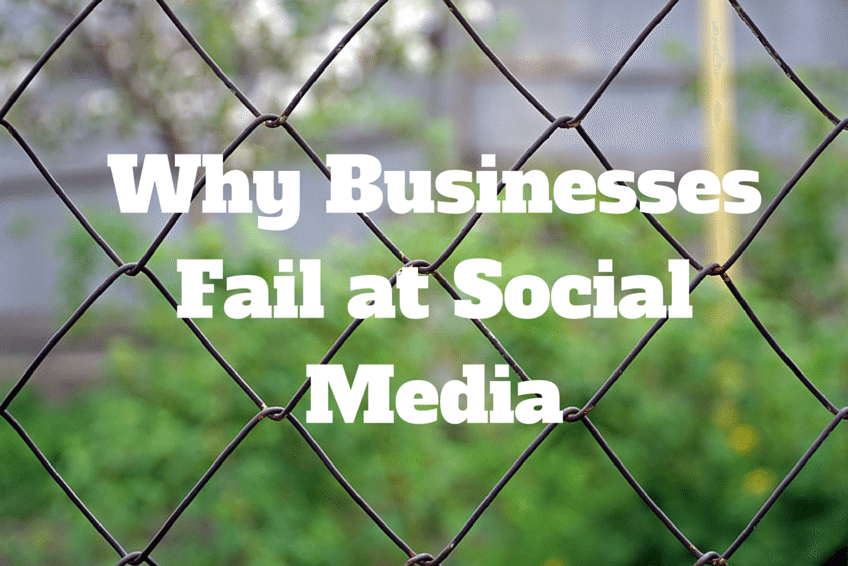 Social media is like cotton – it’s become the fabric of our lives. It permeates throughout our culture and not a day goes by without 100+ media outlets reporting stories that have originated on social media. It’s grown into a preferred form of communication. Why then do so many businesses fail at social media marketing?
Social media is like cotton – it’s become the fabric of our lives. It permeates throughout our culture and not a day goes by without 100+ media outlets reporting stories that have originated on social media. It’s grown into a preferred form of communication. Why then do so many businesses fail at social media marketing?
Social media has made it possible to:
- Stay connected with and retain current customers
- Attract and engage potential customers
- Show the human side of the business
- Break down walls between buyers and sellers
- Laser target ads to people who are interested
- Drive traffic, leads and sales
- Respond to customer concerns quickly
With all that’s available, one would think businesses would adopt social media as part of their web presence and marketing methods, but that’s not been the case. I, along with many others, have been publishing insights and touting the value of social media for years. In some scenarios, the needle has barely moved.
This failure to adopt social media is leaving a lot of marketers, salespeople and employees pretty frustrated with their company’s leaders. They see the value and, in some cases, have taken social media on themselves.
But the buy in and adoption of something, even when it seems like the best, most awesome logical move, doesn’t always happen. In the case of social media, it’s ‘not happening’ often at all levels of business.
A rampant epidemic of connection resistance
Over the past five years, I’ve informally analyzed business’ behaviors around social media and online marketing in general. I’ve discovered that one or more of the following four conditions are why businesses fail at social media marketing.
1. Fear of Social Media
There’s an overriding, if misguided, pressure to get things “perfect” on social media. This sometimes expands into an excuse to avoid getting involved at all.
The permanent nature of anything that’s posted on the web tends to freak out the “control the message” crowd, who have their fingers poised over the delete button to instantly erase ill-advised comments or content.
We’re never far removed from the latest social snafu by a public figure, or the next one to come, and that fear can be paralyzing.
2. No Written Marketing Plan
- 39% of companies who have a documented content marketing strategy are more effective in nearly all aspects of content marketing than their peers who either have a verbal-only strategy or no strategy at all.
- Companies with a documented marketing plan are more than twice as likely to be successful at charting the ROI of their marketing efforts than those with only a verbal strategy.
I’ll admit it, planning is tough. There are so many moving parts to social media that tie back to business processes like leadership and operational development. Many businesses skirt the issues thinking they can take a shortcut to social media success.
3. Distrust Employees, Don’t Empower Them
Many businesses are still blocking social media in the workplace. That’s tantamount to unplugging the phone and taking down your email server.
Are there a lot of horror stories out there? Sure. Could someone say something stupid? Of course. What if our perfect reputation is trashed by one Facebook post or tweet? There are so many what if’s.
Establishing a social media policy mitigates the potential horrors. Empowering employees comes with a solid training and orientation on the components of social media. Customers see employees as the most trusted representative of the company. Why sell yourself short when you can implement processes to take advantage what’s available today?
4. Never Establish WIIFM
Some businesses do dip their toe into the social media stream. Some embrace it a little but then brazenly (often naively) ask their employees to share the company’s updates on their own personal profiles. Just this week I heard about a business who was making it mandatory to share company updates.
You’re doing it wrong!
Asking employees to participate in the company’s marketing without establishing what’s in it for them, leads to nothing worthwhile. The result can often be harmful.
More and more, customers are Googling salespeople. When an employee fully grasps what’s in it for them, and he/she has received social media knowledge and training, they start collaborating with the brand message and act as an advocate. They often start coming up with content ideas and those ideas are what shoot engagement, leads and sales through the roof.
Businesses fail at social media when they don’t focus on connection. Connecting is what social media is for and when customers prefer it, your business should be there with a welcome mat. Don’t miss out by trying to be all things to all buyers. Connect well and often with your target customers and never hear the word fail again.
